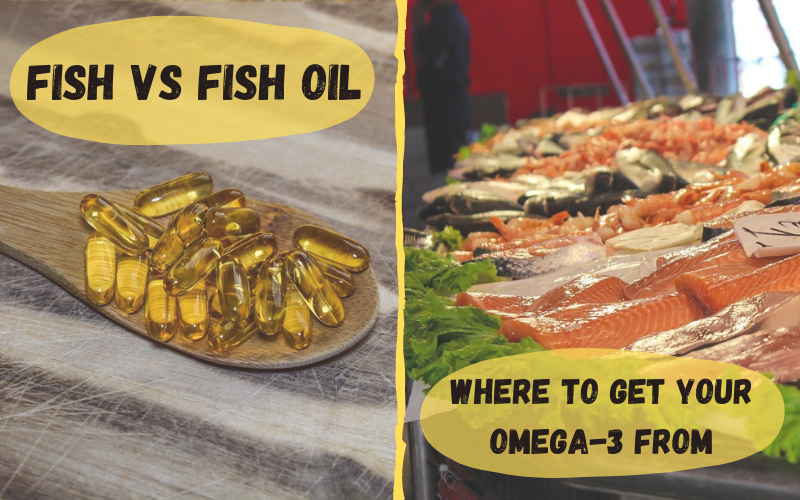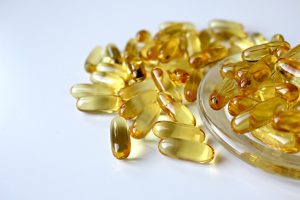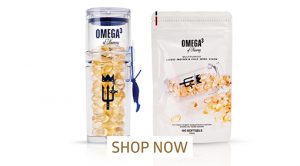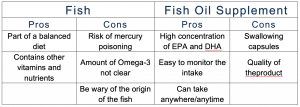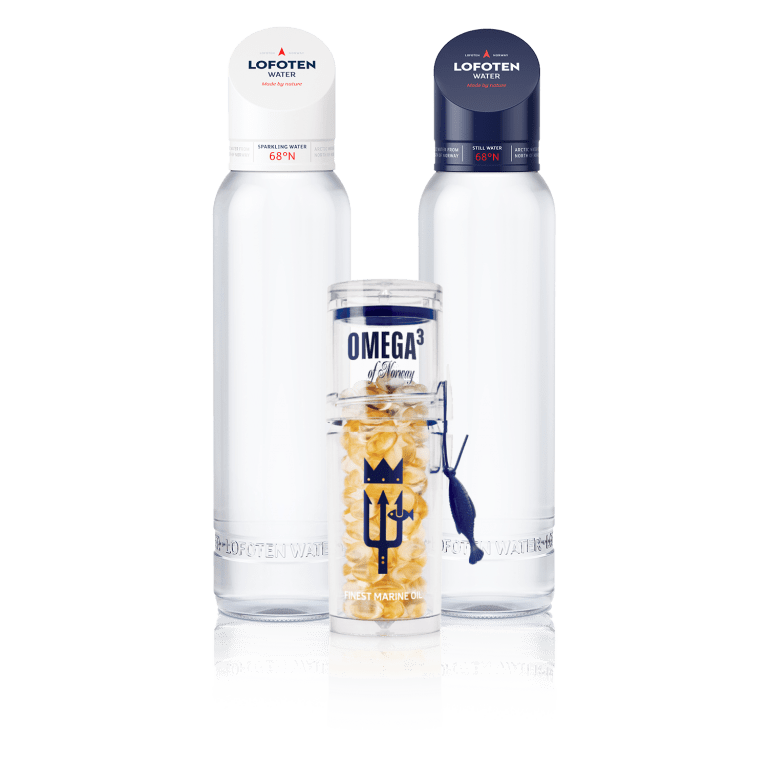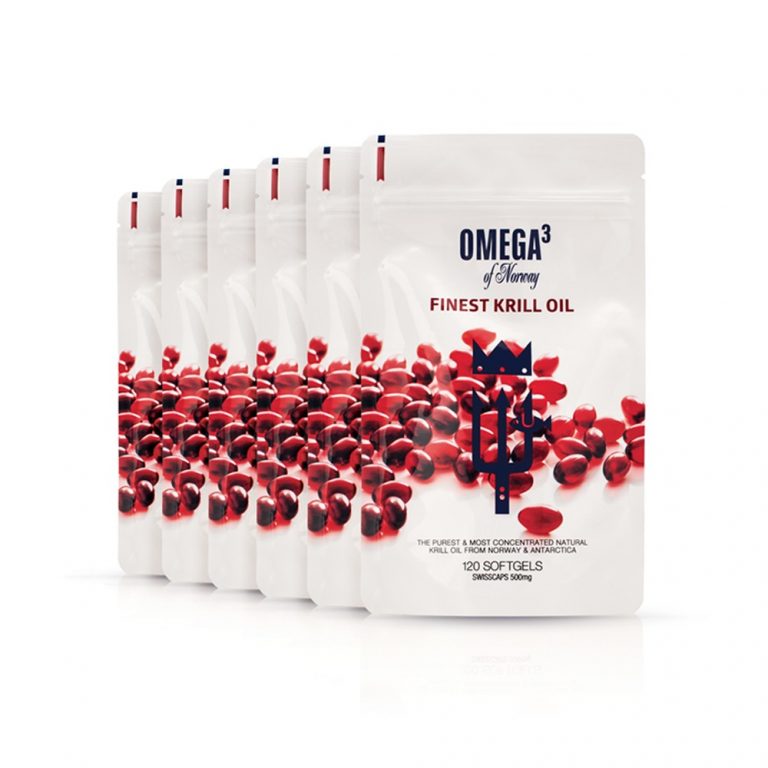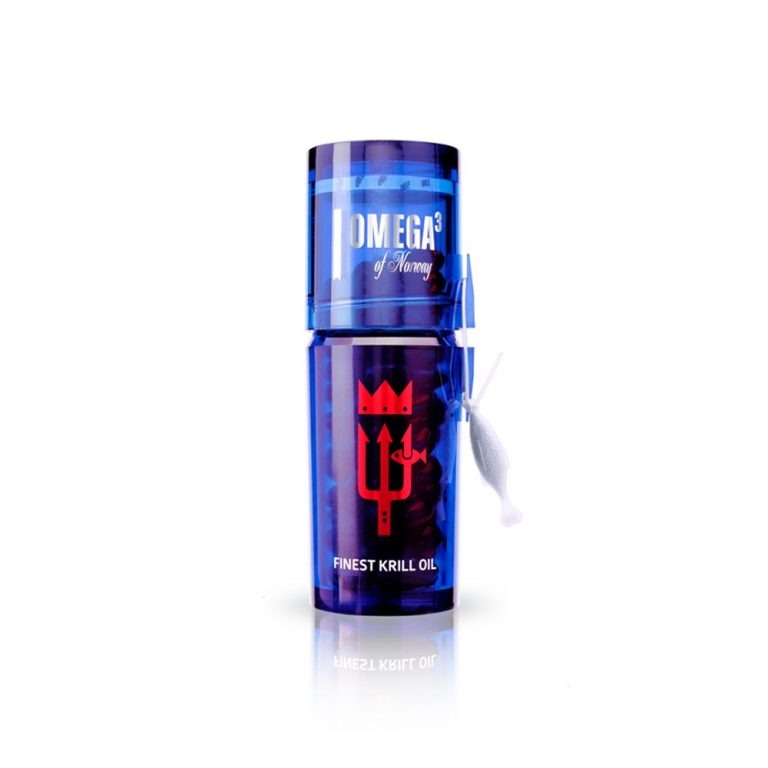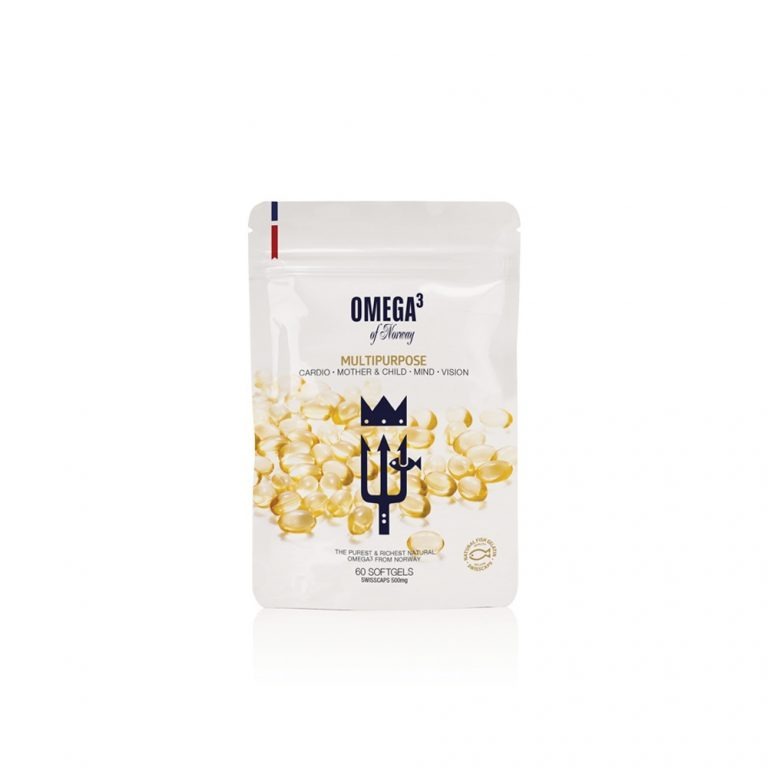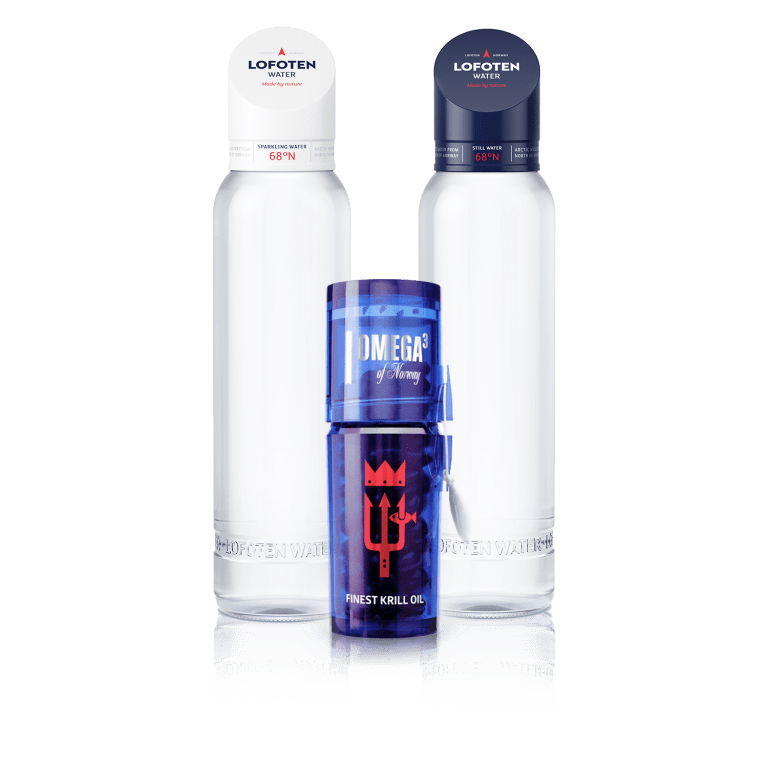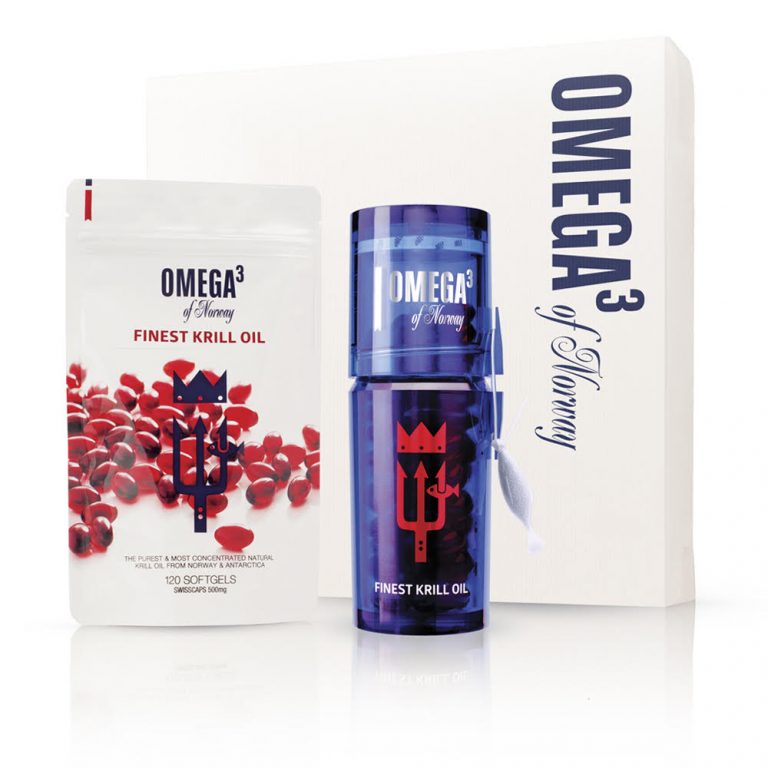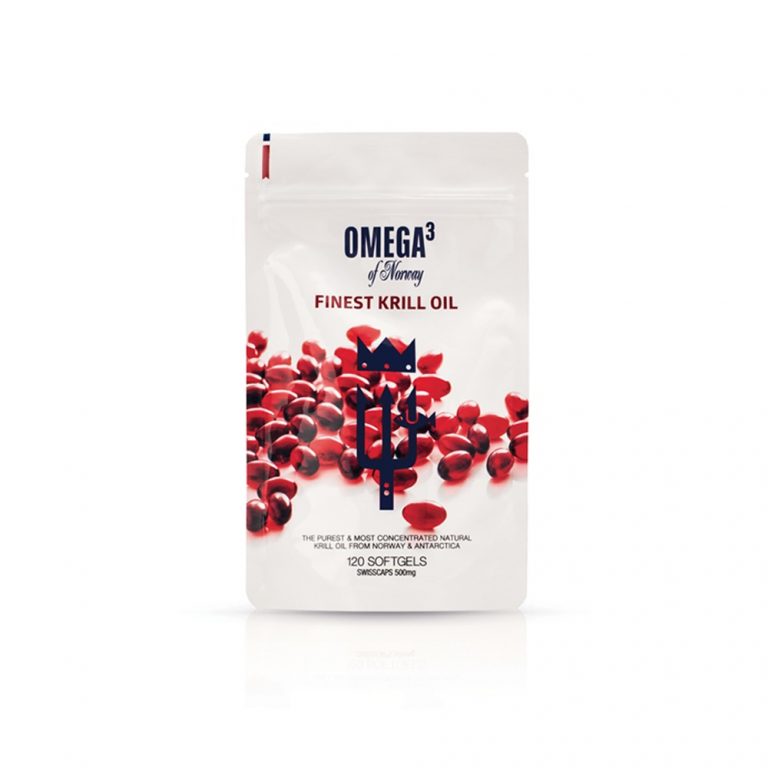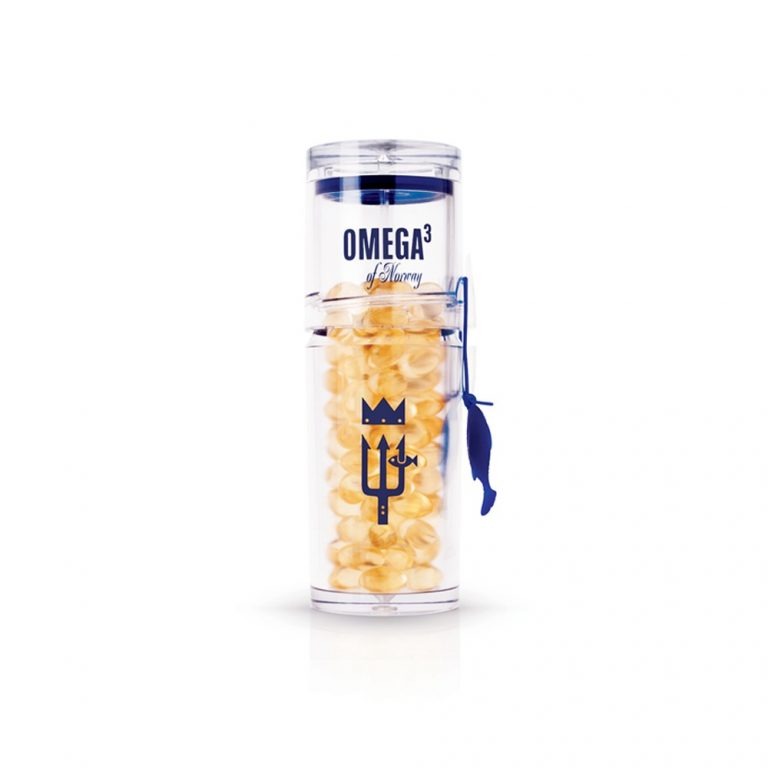Contents
- What are omega-3 fatty acids?
- The benefits of EPA and DHA for: athletes, kids and your immune system
- Fish vs Fish Oil – what’s better?
- Conclusion
Omega-3 fatty acids are essential building blocks of our cells and play an important role in a variety of processes in our bodies. We therefore need to make sure, to always get enough omega-3s into our system, to make the most out of their health benefits.
But how do we best “get” them?
In this article we will talk about the differences of getting omega-3 fatty acids from fresh fish or from a supplement, and what the benefits of each of these options are.
What are omega-3 fatty acids?
Omega-3 fatty acids are a specific type of fat that have a lot of health benefits for our mind and body.
According to Heart UK we need these fats to stay healthy, especially for our heart health. Eating foods high in omega-3 fatty acids and therefore taking in sufficient amounts of EPA and DHA, the most important ones for humans, could possibly help to prevent heart attacks and maybe even strokes.
Essential Fats
But we are not able to produce them ourselves, so they are so-called “essential fatty acids” that we need to consume through foods or supplements. There are different foods that naturally contain omega-3 fatty acids, as well as a range of food supplement with omega-3.
These supplements can be divided in to two types: fish oil and krill oil supplements. They are made from either fish or krill, and both contain the fatty acids EPA and DHA.
However, they have some structural differences, as well as slight differences in their effects on our body. But in summary, both are great for you!
EPA and DHA – what’s that?
Omega-3 fatty acids come in different varieties, which we will explain further in this section.
Alpha linolenic acid (ALA) is kind of the “Mother-Omega-3” because we are able to produce EPA and DHA from ALA. However, this process is not very efficient so it is actually oftentimes better, to consume EPA and DHA directly, instead of relying on transforming ALA. ALA is mostly found in vegetable oils, nuts and seeds like hemp seeds, canola oil or sunflower seeds.
Eicosapentaenoic acid (EPA) and docosahexaenoic acid (DHA) are quite a mouthful and the other omega-3 fatty acids that play a big role for our health and wellbeing.
They are good for our heart health and blood circulation and naturally occur in many foods, mostly in marine sources such as sardines, salmon and mackerel or anchovies.
What are the benefits of omega-3?
The fatty acids EPA and DHA have a lot of health benefits of our mind and body, heart health and even our immune system.
Benefits for Athletes
A lot of people who exercise on a regular basis or even built their career on their performance, consume omega-3 fatty acids on a regular basis.
Omega-3 fatty acids are used a lot in sports nutrition and have been linked to benefits such as
- Helping to gain muscle mass
- Influencing the fat to muscle ratio in your body
- Improve muscle recovery after intense exercise
Furthermore, the anti-inflammatory properties of omega-3 fatty acids may improve the flow of blood and therefore oxygen to your muscles and heart, which could be beneficial for your overall performance and reduce muscle soreness.
Benefits for Kids
Omega-3 fatty acids are essential for the proper functioning of our brain and also its development even before we are born.
Over 60 % of our brain is made of fats, 10 to 15 % of which are DHA, one of the two omega-3 fatty acids we mentioned above. DHA is an important building block of the cell membranes of our brain cells, which means that it can influence the membrane fluidity of the cells and the communication between the cells. This is why it is also believed to play a role in a variety of neurological processes and can be related to cognitive performance with regards to learning, cognitive development and memory.
Benefits for your immune system and natural defenses
Because omega-3 fatty acids have strong anti-inflammatory properties, they are believed to have a positive impact on the occurrence of certain allergies. Allergies are inflammatory diseases, which might explain this correlation.
Additionally, omega-3 fatty acids support your immune system and natural defenses as a whole as they are part of a healthy and balanced diet, which is essential for a well functioning immune system.
Fish vs fish oil
Now that we know why omega-3 fatty acids EPA and DHA are so important for us, here we go back to the question of where we best get them from.
While both fish oil and fish contain the omega-3 fatty acids that we need, there are pros and cons to either of these two options so it really is up to you, to decide which you prefer.
Fish
Pro
- Eating fresh fish is overall a good decision as it provides a lot of important vitamins, minerals and other nutritional elements and should regularly be included in your diet.
Con
- Pregnant or breastfeeding women need to be aware of the possible risk of mercury poisoning when eating fresh fish. However, this risk is relatively easy to mitigate by choosing the right fish (older and bigger predator fish tend to have higher levels of mercury such as swordfish)
- When eating fresh fish you can never really know, just how much omega-3 you are really ingesting from it. Depending on the type of fish, where and how it lived and what it was eating, the omega-3 levels in its body can vary significantly. Good choices are fatty cold-water fish such as anchovies or salmon.
- Be wary of where your fish comes from and if it is wild caught fish or farmed fish. There can be big differences in the nutrients and other substances they contain.
Fish oil
Pro
- Fish oil is produced from the tissue of fatty fish that contain abundant amounts of EPA and DHA. Here at Omega 3 of Norway we use only freshly caught wild water anchovies and a patented molecular distillation process to purify our fish oil to guarantee a high-quality product. Our oils also contain high amounts of triglyceride EPA and DHA, their most natural and easy to absorb molecular structure.
- Because you can find out exactly how much EPA and DHA is in each capsule of your fish oil supplement, you know exactly how high your omega-3 intake is and can get sufficient amounts really easily.
- Some supplements like the ones from Omega 3 of Norway are specifically formulated to maximise health benefits. Which means that they contain extra high concentrations of EPA and DHA in their triglyceride form, which is even easier to absorb into our bodies.
- Even when you are travelling or otherwise not able to cook fresh food or have access to fresh seafood, you can take your supplement pouch with you everywhere.
Cons
- The supplements come in tablets or capsules, which some people might have difficulty swallowing.
- There might be a fishy aftertaste, but here at Omega 3 of Norway we only use the most high quality Swiss Caps with a neutral taste and odor profile.
- The quality of the product. There are many different fish oil or krill supplements out there on the market and it is important that you know how to find a high-quality product. Here we have listed 5 simple steps to find the perfect omega-3 supplement for you.
Conclusion
Now that you know why you should include omega-3 fatty acids into your diet and where you can get them from (fresh fish vs supplements) here is a quick recap of the pros and cons of consuming fish oil supplements vs fresh fish.
Now, what’s your take on getting omega-3 fatty acids from fish oil or fresh fish? Let us know in the comments.
If you want to find out more about our range of products, visit our shop or check out our blog for more information about nutrition, exercise and omega-3.


